The indie author community is a large, resilient and fascinating space. Authors from all over the world come together in online forums, groups, and conferences (in person and virtual), to trade valuable tips and commiserate on the challenges they face.
Still, indie publishing can feel like a bit of a black box. Not everyone has, or wants, a large online network of other authors. And, even if you have cultivated a community of fellow indies, it’s still hard to know what you don’t know.
Every year we survey authors in an attempt to aggregate and share meaningful information on how and what indies are doing. What marketing tactics are working? Are indies using professional editors? What changes as authors increase their earnings?
Back by popular demand, this year we have segmented our data by author income level, and gotten even more granular than we have in the past. Keep reading to learn what differences we see between eight different author income brackets, and join the discussion in the comments to share what you think.
One important thing to note is that income is not necessarily a marker of “success.” Different authors have different goals for their writing, and, for many, income is far down the list of what matters. We are not ranking our survey respondents by dividing the data into income stages. We simply think this is an interesting way to look at the data.
The Author Sample
This year we had over 1,300 authors complete our survey. Thank you to everyone who took the time to share. This would not be possible without your efforts.
Our Stages:
We’ve segmented our responses into eight different buckets based on author earnings level.
Stage 4: $1,000-$2,499 per month
Stage 5: $2,500-$4,999 per month
Stage 6: $5,000-$7,499 per month
Stage 7: $7,500-$9,999 per month
Stage 8: Over $10,000 per month
The image below breaks down some of the main differences between each stage, but be sure to keep reading for more analysis and takeaways.
Note: we asked authors to rank marketing tactics both on effectiveness and if they felt they were overrated or underrated. These are different values. An effective marketing tactic is one that works well. An underrated marketing tactic is one that doesn’t get the attention it deserves.
Disclaimer: While indies are largely an honest bunch, it’s important to keep in mind that all data here is self-reported. We think these results reveal some of the realities of being an author, but this is hardly a double-blind study with a significant sample size.
Ok, without any further ado, let’s dive into the data. First up, Stage 1.
Author Income Stage 1: $0 – $249 per month
Stage one was the largest group of respondents in our survey.
Writing
Average Books Published: 5
Weekly Writing Hours: 10
Stage 1 authors are likely to have around five books published. Yes, this is a lot of writing, but as we’ll see in the following stages, it is by far the fewest published titles of any group in our survey.
These authors are spending around 10 hours writing per week. That’s a significant amount of time, especially when you factor in that over 50% have a day job and many also have families.
Stage 1 authors are resourceful. They were the most likely of any group to have a friend or family member edit their work. They were also the most likely of any stage to edit their own work.
Publishing
Seventy-two percent of Stage 1 authors are spending less than $250 on a cover with 38% spending less than $50.
Once again, this is not surprising. It’s difficult to invest serious money in your publishing career when you’re not raking in the revenue from book sales.
Lower revenue could explain many of the choices authors in this stage are making. For example, over 70% have not published an audiobook—a process that involves significant up-front investment.
At 49%, Stage 1 authors were the most likely of any stage to have none or very few of their books enrolled in KDP Select. Are these authors less likely to benefit from KU? Do they have another reason? Or does having fewer books simply make it more likely to have them all outside of KDP Select?
Marketing
Weekly marketing Hours: 5
Most Effective Marketing Tactics: Promo sites, Bookbub Deals, in-person events.
Least Effective Marketing Tactics: Social media, newsletter swaps, Bookbub Ads.
Stage 1 authors are spending about five hours per week marketing their work. Not a small amount of time, but much less than other stages.
Eighteen percent of these authors said Facebook Ads was the most overrated marketing tactic. This was the highest of any stage, but not very surprising. Facebook ads take time to perfect, and authors who have been published for longer will have had more time to learn.
“They are good, but people treat them like they are a magic bullet. In reality they are hard to get working,” one respondent wrote.
For the most underrated marketing tactic, 19% of Stage 1 authors chose in-person events. However, other stages were more likely to see in-person events as overrated. Once again, lower book sales could explain this difference.
If you are not selling hundreds or thousands of books, doing an event and selling five copies could be a massive sales day. For authors who are earning over six figures a year, it’s hard to sell enough at an event to move the needle.
In-person events also can be an opportunity for deeper connection. “I love meeting readers face to face,” one respondent wrote. “If they enjoy our interaction, there is a high potential for good word of mouth advertising.”
Stage 1 authors were also the most likely of any group to have a book priced over $10 at the time of the survey. Whether they have opted out of the pricing competition on retailers, or they simply haven’t seen the benefits of lower prices, these authors see the value of their work.
Author Income Stage 2: $250 – $499 per month
Stage 1 and 2 authors had the most similarities of any two stages in our survey, but we did notice some differences.
Writing
Average Books Published: 10
Weekly Writing Hours: 12
Stage 2 authors were likely to have around 10 published books. That’s twice as many as Stage 1 authors.
Stage 2 authors are also investing more in editing. Over 66% work with professional editors, and a majority are spending over $250 on editing per book.
Similar to Stage 1, Stage 2 authors are spending about 12 hours per week writing.
Publishing
The increased investment in editing is also clear in book packaging. Stage 2 authors are spending more on cover design, and over 58% have a relationship with a professional cover designer. These authors have learned the value of quality presentation, and are more likely to invest financially in it.
Stage 2 authors were also much more likely to be enrolled in KDP select. Over 65% had all or most of their books in Kindle Unlimited.
Marketing
Weekly marketing Hours: 5
Most Effective Marketing Tactics: Promo sites, Bookbub Deals, Newsletter swaps.
Least Effective Marketing Tactics: Bookbub Ads, Social media, Facebook Ads.
Stage 2 authors are also spending about five hours per week on marketing, but they have slightly different opinions from the Stage 1 authors.
Unlike Stage 1 authors, respondents in Stage 2 found social media posting to be the most overrated marketing tactic. These authors found that social media tended to take lots of time and yield few results.
Stage 2 authors ranked newsletter swaps as the most underrated tactic. These authors have been published for longer, and are starting to make connections and do cross-promo with other authors.
The key to a good newsletter swap is finding the right fit. “When you find a well matched newsletter, those readers are already primed to read your work,” one respondent wrote.
Author Income Stage 3: $500 – $999 per month
Writing
Average Books Published: 23
Weekly Writing Hours: 20
Stage 3 authors are more likely to have been published for three years or longer, and it’s in this stage that we see our first big jump in the number of books published. These authors are likely to have published around 23 books – more than double Stage 2.
These authors also spend more time writing each week, coming in at around 20 hours. How are they spending so much time on writing? One reason could be that only 29% of this group had a day job that is unrelated to their writing, down from 44% of Stage 2 authors.
Publishing
Stage 3 authors were the most likely of any group to design their own covers. Over 27% design their own covers, and over 57% work with a professional designer. Overall, they are spending a similar amount on covers as Stage 2 authors.
Stage 3 is also the first stage where a majority, over 52%, of authors have published an audiobook.
Marketing
Weekly marketing Hours: 7.5
Most Effective Marketing Tactics: Promo sites, Bookbub Deals, Newsletter swaps.
Least Effective Marketing Tactics: Bookbub Ads, Social media, Amazon Ads.
Stage 3 authors are spending a similar amount of time on marketing as their Stage 2 counterparts, coming in at around seven and a half hours per week. These authors have more time to spend on their author careers, and most are choosing to spend that time writing rather than marketing.
Stage 3 authors are also starting to see the benefits of free promos. Over 32% had a free book at the time they took the survey, and over 66% see giveaways as an effective marketing tool.
Like every single stage, these authors ranked Bookbub Deals and promo sites (like Freebooksy and Bargain Booksy) as the most effective marketing tactics.
Most overrated marketing tactic for Stage 3 authors? About 18% said Amazon Ads citing difficulty getting a positive return on their ad spend.
For the most underrated tactic, these authors also chose newsletter swaps.
Author Income Stage 4: $1,000 – $2,499 per month
Writing
Average Books Published: 28
Weekly Writing Hours: 20
Stage 4 authors are likely to have published around 28 books, and, like Stage 3, they are spending close to 20 hours per week writing.
About 80% of Stage 4 authors have been published for more than 3 years, and many have been at it for longer.
When it comes to editing, Stage 4 authors are similar to Stage 2 and 3. A majority work with professional editors, but about a quarter do their own editing.
Publishing
One distinct change we see with Stage 4 authors is the investment in cover design. Around 73% are working with a professional cover designer (up from 57% of Stage 3 authors), and about 69% are spending over $100 per cover.
Stage 4 authors have the experience and resources to make investments like this. They are generating sizable revenue from their book sales, and are investing their earnings to grow their author business.
We also see this increase in investment with audiobooks. An expensive proposition, but Stage 4 authors are diving in. Over 66% have published an audiobook.
Marketing
Weekly marketing Hours: 10
Most Effective Marketing Tactics: Bookbub Deals, Promo sites, Facebook Ads.
Least Effective Marketing Tactics: In-Person Events, Bookbub Ads, Social media.
No matter what your imposter syndrome may tell you, authors are working a lot. In Stage 4, we’re starting to approach full-time job territory. These authors are spending about 10 hours a week marketing, in addition to the 20 hours spent writing. That’s a lot of time!
Stage 4 authors were similar to every other stage, ranking Bookbub Deals and promo sites (like Freebooksy and Bargain Booksy) as the most effective marketing tactics. But, about 30% rated in-person events as the most overrated tactic.
“Although it’s nice to meet readers, the audience is very limited,” one respondent wrote. “At best, you’ll have a few hundred people stop at individual tables and fewer will buy books.”
Stage 4 seems to be the breaking point where it becomes difficult to sell enough books at an event to see a significant boost.
Author Income Stage 5: $2,500 – $4,999 per month
Writing
Average Books Published: 28
Weekly Writing Hours: 20
Stage 5 authors have likely been published for a while. Over 63% have been published for more than five years.
One interesting thing we saw here is the similarities between Stage 4 and Stage 5 in the number of books published and time spent writing. Stage 5 authors were also likely to have published around 28 books, and spend 20 hours writing per week.
Editing is where we start to see a divide between Stage 4 and 5. In Stage 4, around 61% of authors work with a professional editor. In Stage 5, this number jumps to over 73%. This means that stage 5 authors are also spending more money on editing than authors in previous stages.
Publishing
Stage 5 authors are similar to Stage 4 when it comes to cover design. At 68%, a solid majority work with a professional designer and spend over $100 per cover.
Audiobooks? You guessed it. Stage 5 authors are generating significant revenue from their writing, and this helps over 76% of them to publish in audio format.
Marketing
Weekly marketing Hours: 10
Most Effective Marketing Tactics: Bookbub Deals, Promo sites, Amazon Ads.
Least Effective Marketing Tactics: In-Person Events, Bookbub Ads, Book Giveaways.
Stage 5 authors are also spending about 10 hours on marketing per week, but we start to see more authors having someone helping with their marketing. About 23% of Stage 5 authors pay someone to assist with marketing.
There are many similarities between Stage 5 and Stage 4 authors, so how do we explain the difference in earnings? We think for many of these authors, it comes down to experience.
Stage 5 authors are more likely to have been published for longer, and they have found some marketing success. Yes, they spend roughly the same amount of time on marketing as their Stage 4 counterparts, but perhaps they have had the time to build an audience, skills, and knowledge that give them better results with the same investment. Of course, this is speculation and it will be different for different authors, but we think it’s a reasonable explanation.
One Stage 5 author advised other authors to get focused: “Do less: do what actually works, don’t chase all the shiny things.”
Stage 5 authors have a large backlist, and they are discounting some titles to take advantage. Seventy-six percent say free book promos are an effective tactic, and 65% had a free or $0.99 book at the time of taking the survey.
Like Stage 4, Stage 5 authors ranked in-person events as the most overrated marketing tactic.
Stage 5 authors love newsletter swaps. Over 27% ranked newsletter swaps as the most underrated marketing tactic, the highest percentage of any stage.
“They aren’t flashy, but, if you swap with carefully chosen authors, they work,” one respondent wrote.
Author Income Stage 6: $5,000 – $7,499 per month
Writing
Average Books Published: 45
Weekly Writing Hours: 24
Stage 6 authors are earning a lot of money from writing, and they know they’ve got something good. Many are spending about 24 hours a week on writing, which is slightly more than Stage 5 authors.
Eighty percent of Stage 6 authors have been published for more than five years, and it seems that many publish at a lively clip. Stage 6 authors are likely to have published around 45 books. This massive backlist is the major differentiator we saw between Stage 5 and Stage 6 authors, and the value is clear. “Just keep writing,” one author advised.
Publishing
Like Stages 4 and 5, Stage 6 authors are likely to work with a professional designer, and most spend over $100 per cover. An attractive cover is critical to selling books, and, by Stage 6, authors certainly have this figured out.
Around 85% of Stage 6 authors have a published audiobook.
Marketing
Weekly marketing Hours: 13
Most Effective Marketing Tactics: Bookbub Deals, Promo sites, Facebook Ads.
Least Effective Marketing Tactics: In-Person Events, Bookbub Ads, Social Media.
Stage 6 authors are spending a bit more time marketing each week, coming in at around 13 hours. And 35% have someone to help with their marketing.
Like all stages, Stage 6 authors ranked Bookbub Deals and promo sites as the most effective marketing tactics, and this Stage gave Bookbub Deals the highest rating of any Stage.
Email promos and Bookbub Deals both generate significant results in a short period of time, and they don’t take as much time or skill as other marketing tactics. Scheduling a Freebooksy promo takes less time and generates more downloads for most authors than posting on social media or running digital ads. By using email promos, Stage 6 authors are investing in effective, easy to do, marketing tactics.
Stage 6 authors also ranked in-person events as the most overrated marketing tactic, and newsletter swaps as most underrated.
Author Income Stage 7: $7,500 – $10,000 per month
Writing
Average Books Published: 45
Weekly Writing Hours: 25
Eighty-nine percent of Stage 7 authors have been published for more than five years, and, like Stage 6 authors, they are likely to have around 45 published titles.
These authors are more likely to support themselves and their family entirely from their writing, and, similar to Stage 6, they are likely to spend about 25 hours writing per week.
Stage 7 authors are also more likely to spend more on editing than previous stages. Around 70% spend over $250 on editing per book, more than any previous Stage.
Publishing
Stage 7 authors are similar to Stage 6 when it comes to covers. Around 70% pay over $100 per cover, and they are likely to work with a professional designer.
Marketing
Weekly marketing Hours: 17
Most Effective Marketing Tactics: Bookbub Deals, Promo sites, Amazon Ads.
Least Effective Marketing Tactics: In-Person Events, Bookbub Ads, Book Giveaways.
A big difference between Stage 7 authors and previous stages is their weekly time spent marketing. Stage 7 authors are likely to spend around 17 hours marketing per week, the most of any stage.
Forty-five percent have someone help with marketing, but 50% are still doing it all on their own.
Another difference we see in Stage 7 is that 57% said marketing was the hardest part of publishing. This is the lowest of any stage except for 8, and ten percentage points lower than any previous stage.
“Find your strengths and write, publish, and market to them,” one author wrote. “Don’t try to emulate the processes of other authors, find what works for you.”
One thing is for sure, these authors are good at marketing, and they work hard at it.
You guessed it, Stage 7 authors rated Bookbub Deals and promo sites as most effective, but they also rated Facebook and Amazon ads as more effective than previous stages. Stage 7 authors have the experience and audience to have more success with digital ads.
The key is to keep working at them. “People tend to give up,” one respondent wrote. “But Amazon ads are really effective if used wisely.”
Learning to run Facebook and Amazon ads, or finding someone to run them for you, is a great investment for authors. Most authors at this stage have been running ads in some capacity for years. This accumulated skill allows them to have more success and spend a little less time on their ads.
Author Income Stage 8: $10,000+ per month
We’ve reached our final Stage of authors, Stage 8, which includes authors making over $10,000 per month from their writing. Now that’s a LOT of money.
Writing
Average Books Published: 50
Weekly Writing Hours: 26
Stage 8 authors are likely to have published around 50 books, but many have well over 100 published titles.
They are spending around 26 hours per week writing, and have generated a significant backlist over the years.
With more resources, these authors invest in editing. Over 50% pay over $500 on editing per book, far more than any other group. These authors know the value of well edited work, and they can afford to make sure their books avoid low reviews for mistakes.
Some of our favorite advice from this stage? “Don’t read your one star reviews, just don’t.”
Publishing
Stage 8 authors are also the most likely to work with a professional cover designer at around 75%. These authors have the resources to invest in quality design, and they know how important a cover can be.
“Bad covers will kill a career,” one author wrote. “Full stop.”
If one of your goals is to increase your book sales revenue, investing in quality cover design is an absolute must.
Marketing
Weekly marketing Hours: 13
Most Effective Marketing Tactics: Bookbub Deals, Promo sites, Facebook Ads.
Least Effective Marketing Tactics: In-Person Events, Bookbub Ads, Book Giveaways.
Stage 8 authors are spending about 10 hours per week on marketing. Many of these authors are paying for some help with marketing, and around 8% are paying an expert to do it all. However, over 45% are still doing all their own marketing.
“The only time you fail is when you don’t learn,” one author wrote. “Experiment with your books. Don’t expect it all to work but review why. Don’t make it personal. Look for solutions.”
The fact that so many of these authors are doing all of their own marketing may be surprising at first look, but on further examination it starts to make more sense. Many of these authors started in Stage 1, and they learned the fundamentals of book marketing, and the particulars of marketing their specific books, from the ground up. By the time they arrive at Stage 8, they have confidence in their skills, and they may not see the appeal in handing over marketing to someone who may not have the same level of expertise.
These authors also chose newsletter swaps as the most underrated marketing tactic and in-person events as most overrated, but they chose Bookbub Ads as the second most overrated marketing tactic.
“When I first started they were amazing,” one author wrote of Bookbub Ads. “But these days their efficacy has decreased significantly.”
Overall, Stage 8 authors advised other authors to stay consistent and play the long game: “Don’t give up. Write every day.”
In Summary
In this post we’ve broken authors down into eight different stages, but there is still lots of variability within each stage. Not every Stage 6 author is spending 13 hours marketing each week, and not every Stage 1 author is spending 10 hours writing per week. What the stages do illustrate are some general changes in focus and investment over time. As authors earn more, they begin to invest more in editing and cover design. Is this simply because they have the resources? Or did this investment generate more book sales? It is likely different for every author.
Authors who feel bogged down by marketing should take heart that marketing tends to be a part-time activity for authors across every stage. You don’t need to put in 40 hours a week to see success. As authors gain skills, they are working smarter, not harder.
Additionally, feeling like marketing is a drag is not unusual. Our respondents were likely to rank marketing as the most challenging part of the publishing process, regardless of stage.
Another area where we didn’t see much variance was the wide versus exclusive debate. Overall, respondents were slightly more likely to be enrolled in KPD Select, but not by much. And many authors have some books in and some books out.
There is also a lot of variability in author earnings that our survey cannot necessarily explain. In general, author earnings increased as more books were published, but for a few stages, the number of published titles remained largely similar yet earnings were different. Genre, marketing skill, luck, and many more factors could cause this. But we can’t know for sure.
Thanks again to everyone who took the survey. We all appreciate your generosity.
So, talk to us in the comments below. Did any of our findings surprise you? Any tips to help your fellow authors get to your stage? Let us know!
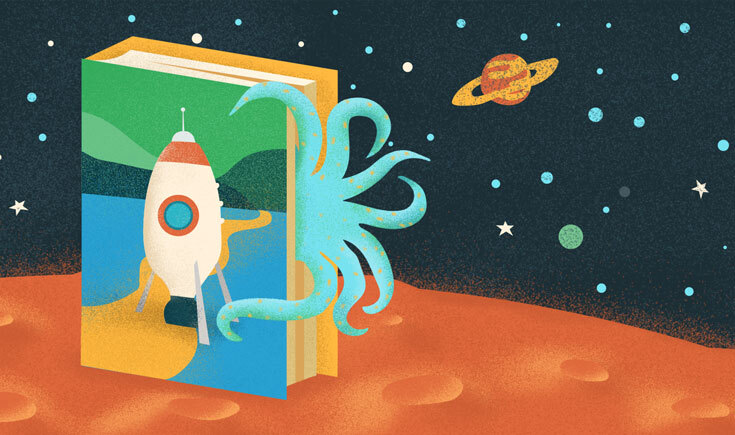
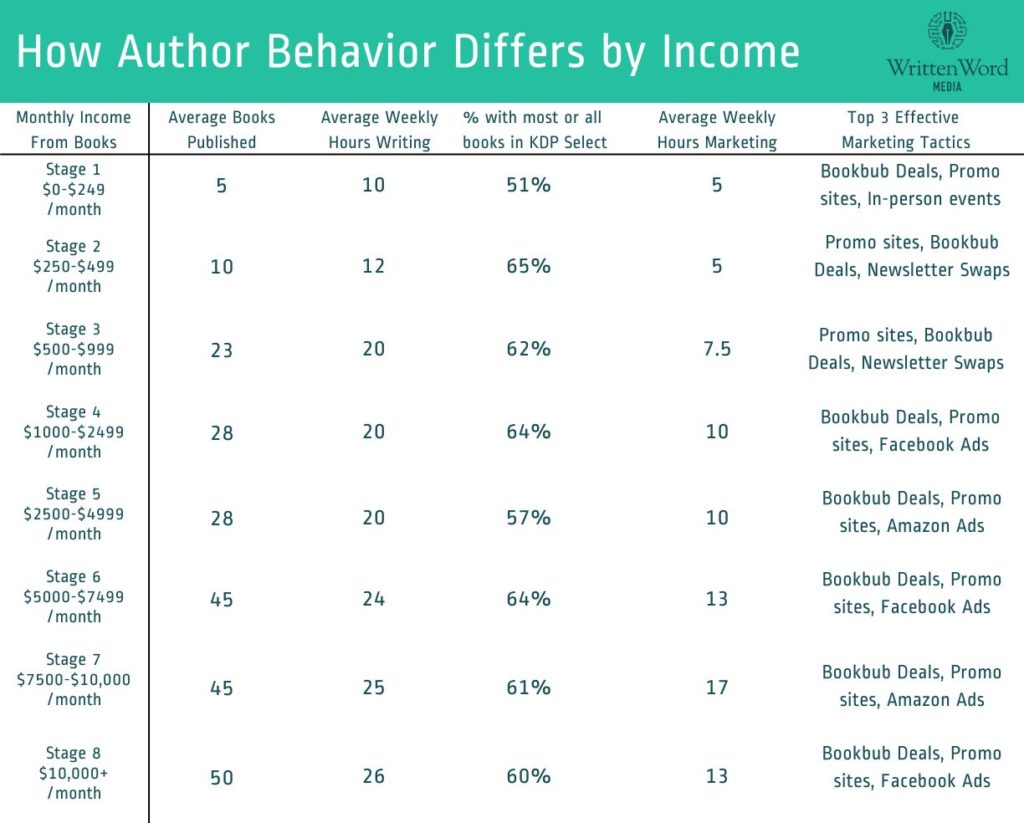


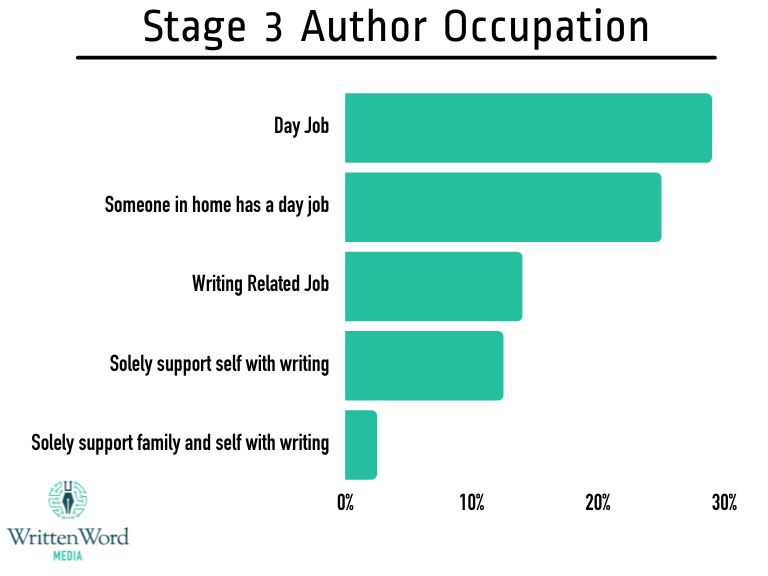
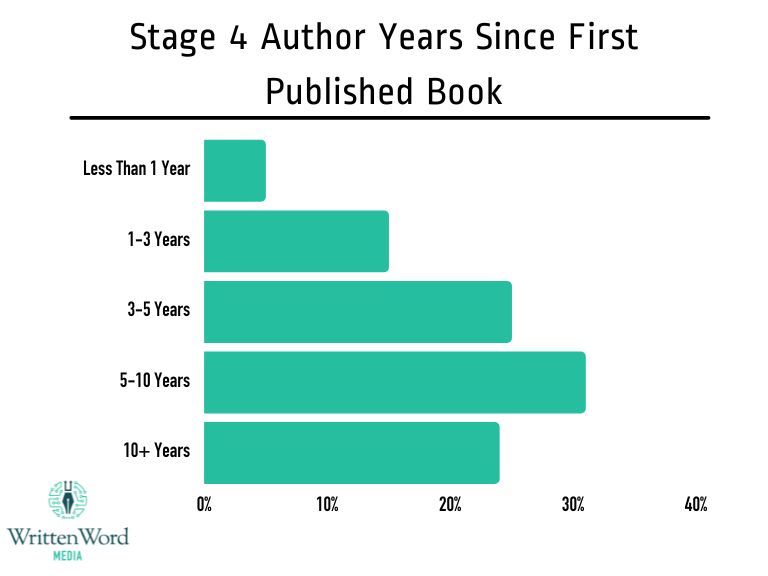
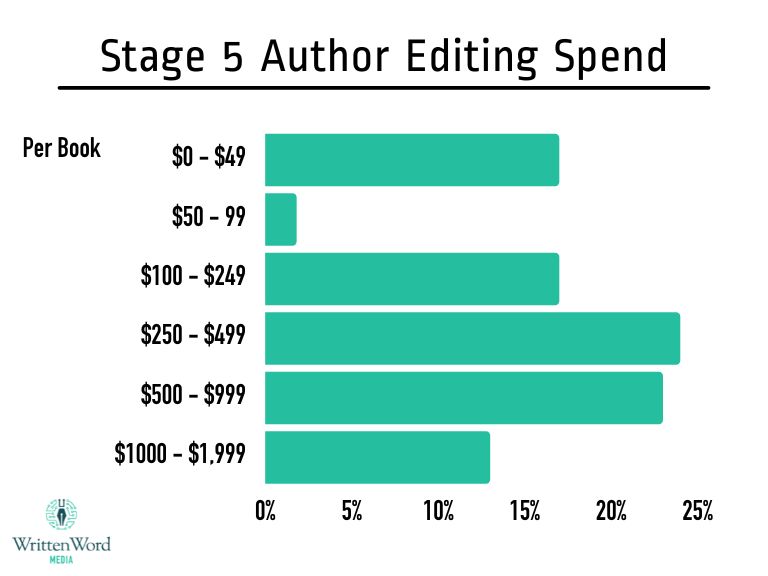
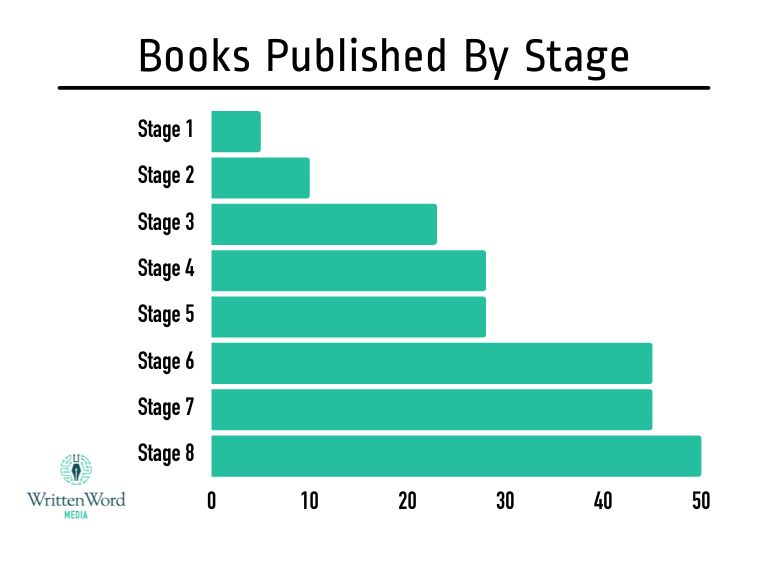
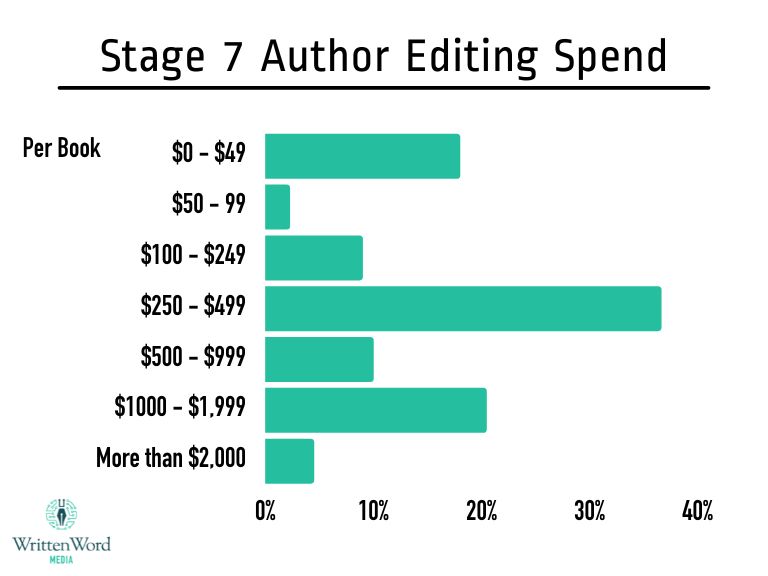
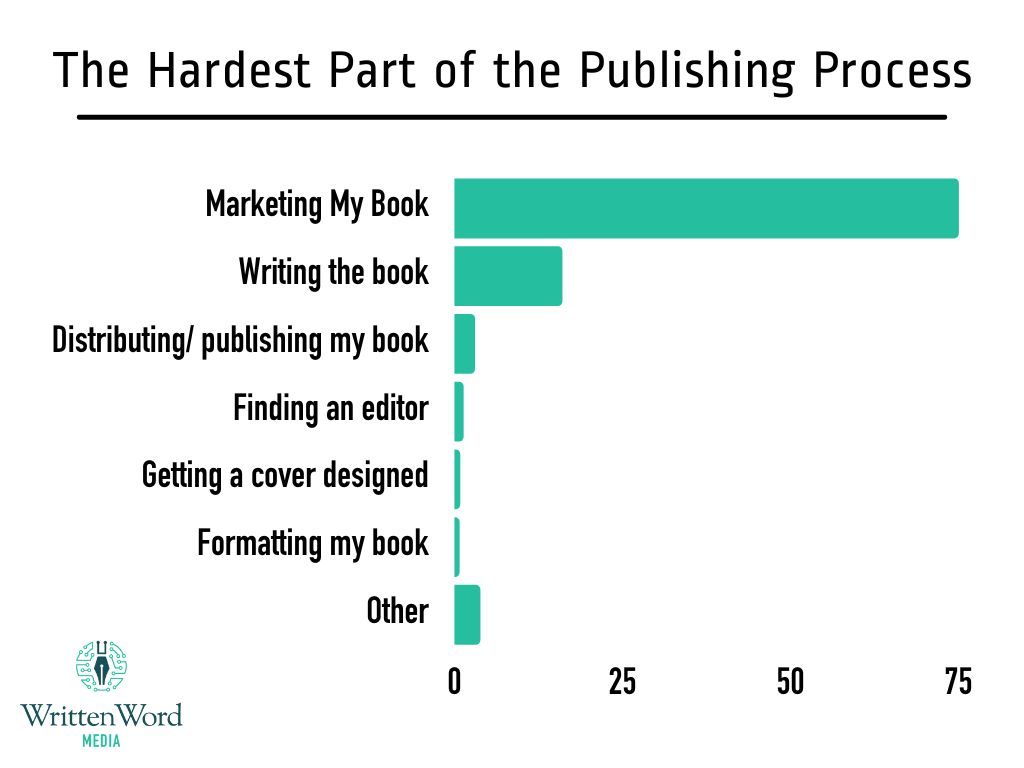
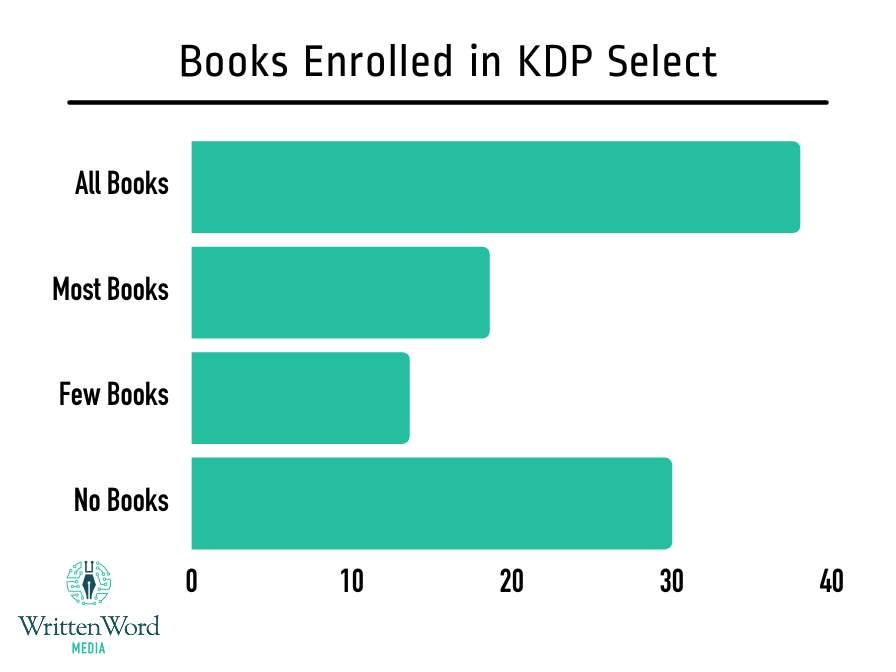
This is a great breakdown! Thank you for sharing. A lot of good insights in this.
Thanks Danica!
Nicely done on the survey. Thank you for doing it and taking the time to share. The long game is where you find the real players. Learning from each book to do better with the next.
Thanks Craig!
I was shocked at how little most writers spent on editing. I’m a Stage 1 (or maybe 2 this year) respondent with three published books. I’ve spent more than $1000 for two of my books and many hundreds for the third.
Also, this was an informative survey despite its small sample size and unscientific approach. As you said, it’s just plain hard to get data like this, so anything is helpful for those of us in the trenches. Thanks.
You’re welcome Chris. We’re glad you found it useful!
I was surprised at this also until I remembered that I spent more on editing (about the same as what you’ve spent) when I had fewer books because I always always did developmental edits then, and those cost a lot more than line editing and copy editing. When you’re still new at writing, your books are going to benefit hugely from a developmental edit (think of it like learning the ropes of creating a book that’s satisfying) than once you’ve gotten the hang of story structure, genre expectations, and all the other nuances that go into creating a great story. So that could be why authors with more books don’t have to spend as much on editing. Bc by the time they’ve hit their stride, they don’t need developmental edits quite so often, if at all.
I think a big part of the information is the “at least” amount, because good editing often does cost more. When you think about the amount of time an editor is going to spend on your book and their need to survive and not starve… paying more for a pro makes sense to me.
At the same time, when you’re just starting out, investing that money can be hard, so I think this reflects some of the accommodations beginning writers need to make.
Thank you so much for doing the survey. Very interesting!
We’re glad you found it useful Kit!
This is really interesting, and for me, very positive. I am doing better than I thought with the number of books I have out. Keep doing what I’m doing is my motto!! As it is obviously working.
Well, I sure hope BookBub reads this. I know only one author who breaks even on their BB ads. Everyone else has sunk their money. After hearing the word of mouth, I have no plans to try them, which is too bad because I feel like I owe BookBub a great deal of my success thus far thanks to BBFDs. It would be amazing to have a real third ad alternative to AMS and FB, so I hope they can find a way to make ads profitable for authors as well as themselves some day soon.
As a two year author who is in Stage 7 with less than ten books, it’s clear from this survey that you can write a lot of books without ever being very profitable. Mastering ads is the key to “levelling up” but so many people seem to give up because they find marketing too challenging.
Great point, if revenue is a primary goal for you, becoming skilled at running ads and marketing in general is key.
I am one of the authors who makes a killing off BB ads. (AND the BBFDs.) It’s a very tough skill to master, and it takes money to make money. The key is to target yourself at the upper echelons; those are the readers who want to hear about your book, and it becomes one of the cheapest ways to promo your book.
I can just throw a thousand dollars at a bookbub ad and get hundreds upon hundreds of sales. My sales price is $5.99-$7.99 nowadays.
But you gotta advertise smartly, understand how the art influences the buyer, and know which targets to pick. If you don’t bring an excellent marketing package to the table… readers pass. The market has become tighter.
So the ads just have to be THAT much better nowadays.
It’s good to hear it’s working for someone. But if you don’t have thousands to throw at it is it even worth it? Like will a budget of $300-500 even matter?
That’s a fascinating comment. Maybe you could put a guest post on someone’s blog giving more info about your strategy! “…understand how art influences the buyer,” and “know which targets to pick” are intriguing comments. Would love to hear more on this!
You need to set up your own course on how to do this. You’ll probably make a mint. Good luck
I agree, Indie Romance Author. I do the marketing for my husband and we are well into stage 8 with 20 books out. Years ago, like 2016/2017 Bookbub ads worked well, but I’ve tried them again several times over the past couple of years, using various recommended techniques, and they are like burning money, and I’m a confident marketer. I avoid them completely and focus on facebook and Amazon ads.
Hmmm. I found these stages unhelpful and over-simplified, to be honest. I’ve written over 15 books and been writing for over 40 years and yet my earnings are right down there with Stage 1(except when I had a traditional publisher year ago). The progression or lack of is not necessarily linear. I appreciate you did mention a lot of variability. But so many other factors come into play eg luck with getting a BookBub acceptance (I think you mentioned this). Plus I have long term health conditions and disabilities which means I don’t have the time and energy nowadays. It would be interesting to see how other writers of diversity fare. I also found it very US centric eg figures in dollars but I’m in the UK. Maybe you could factor these in for the future
Hey Kate, Sorry you didn’t find it helpful. It’s certainly true that these stages are very generalized, and many authors are going to be outside of the average. Great suggestion about broadening out to other nations and asking more about what challenges authors are facing outside of the the publishing world.
I am not surprised by the lack of success with BookBub ads. I once found them to be excellent but they changed something and have become ineffective and a waste of money. I think David Gaughran blogged about their ads no longer worth it.
I suspect that EVERYTHING on the Internet has a limited life of success. I had read that Kirkus Reviews had enormous potential. Everything they reviewed was supposed to get you sales. You pay for the review.
They are honest and give you an honest review. If the review turns out to be bad, you have the option to not have it published. I bought the deal. Can’t recall the specific amount, between $400 and $500. The review was better than I expected. I showed it to a writer friend who had a dozen or two books published. She said she’d give her right arm to get a review such as this one for any of her books. My book failed to get a single sale. She checked around and found others had the same experience. Kirkus had power in its early life but lost it. I get the sense that everything on the web could fail after a while, including Facebook, Instagram, Twitter, etc. The volume of stuff trying to entice audiences is just too great. People tire of anything much faster than they used to. Marketing of books is the most difficult. I had a long career on Madison Avenue and recall a conversation with a P&G marketing man who felt that book publisher all fail to do a decent job. I thought about this and came to the conclusion that it is impossible to effectively market a book. Word of mouth, personal recommendation, seems to be the most effective. If you can find a celebrity or someone in the news to recommend a book, you’ve got it made. A good cover with an attractive title is the next best thing. I’ve got 13 titles on Amazon. One of these outsells the other 12 combined. The combination of the title and cover must be the reason.
Interesting sales figures. I had a similar experience with my first nonfiction about the space economy. It wasn’t my best writing, but last year it sold more than previous years and without promos. The market is the universe. If you can work a corner of it, stick with it.
Marketing SUCKS! I hate it LOL However, this data was amazing. My day job is a data analyst so I loved it!
One problem I see with marketing is different tactics are better for different genres and age groups. Next time I would love an additional dimension on the survey for what the authors publish—maybe social media is great for romance writers and Amazon Ads are working for non-fiction?
It was helpful to see what tactics improved as the highest income authors saw a return on ads.
I would love to get involved in an author/marketer group where we round-tabled marketing responsibilities and learned faster what’s working for our different books.
Great point about the genre variability. I also love this round table marketing idea!
Good point, Monica. The different genres would seem to naturally have varied marketing strengths and factors.
Thank you for this. It’s really interesting and helpful to read the results.
Huh, my question is how big was each bucket. Did I miss that? As in, you had 30% of respondents in Stage 1, 50% in Stage 2, what have you.
Hey Billy, Stage 1 was by far the largest at about 45% of respondents, the rest were fairly evenly distributed across stages.
Thanks, I appreciate it!
I was going to ask the same thing. I’m really curious about what stage the bulk of authors are in. I’d love to see a graph of that.
I was also wondering why the top tier stopped at $10K? It would be interesting to know what percentage of authors are making $250K, $500K, and a million or more a year.
There used to be a report that came out every year that was amazing – author earnings I think it was called…
Anyway, the breakdown was so informative.
There is very little information out there about indie authors, and how people are really doing with writing, publishing, and marketing. Since most of us are working alone, it’s hard to gauge if we are doing well within the industry as a whole.
Thank you for this report!
I literally read every word and I do appreciate this a LOT, but I have a couple of concerns. 1-I’ve been published for 5 years I’m in at least 30 book groups on a regular and have never once come across your survey to take it. My issue is where are you posting this survey, in what groups/associations? I’m in several well-known groups that have 10X the authors of your sample size
2-if you are only placing the survey in certain author association groups or affiliates you are not getting a diverse pool and I mean diverse in race. A wider-reaching survey would probably make a big difference. Not to mention survey was spilt into core genres.
3-why not move to a 20k, 30k, 40k 50k avg per month lumping so many people into the over 10k is not good. Your sample size is just too small and as I don’t know where your survey link was put it’s probably a very narrow section of indie writers.
Think about leaving the survey up longer and taping in to those REALLY big indie author associations and FB groups AND then telling them they are free to share it with any speciality writer groups they are in. (sci-fi, romance, cozy, crime, thrillers etc, and asian writers, black writers , lgbtq writers, writers with disabilities etc, all have focused groups for their writers, but also are in these large genearl indie writer groups.
5 do you ask how many authors also have traditionally published books. From being in the groups I can tell you a lot of folks who have been writing for 10+ are hybrid now. How they view things and the success (or not) they may be getting since going indie is worth looking at, as their trade published back log and any success may help them.
6-give us a breakdown of race. No one across the industry will confront this with data, how many X race writers are in each of these catorgries, where do the majority fall. This goes back to my other point. An entire LARGE segment of black writers are writing black-focused indie books, in ubran lit, hood lit and EVERY OTHER genre as well. Many are killing it or so it seems, as we have no data on this segment. I can tell you now how they market and what works best will be different as sadly there are so many of them who have never heard of bookbub or a lot of the ad companies to run promos.
Black Contemporary romance vs Traditional White Contemporary could be an entire survey of it’s own with eye-opening results. If you disperse the survey to a wider audience you can then have the data to down the road do my targeted niche survey within the wider indie industry.
Again love the info and I know, one can’t “do it all” but you could easily do a “bit more”
Hey Amber, thanks for this response. You’ve absolutely hit the nail on head with the limitations of the survey. It’s a small sample but we do try to get the word out as much as we can. ALLi was helpful in promoting it to their audience in addition to ours. We would certainly love to have as large a sample as possible, and you bring up great points around race and genre. Those two factors could certainly impact what works or what doesn’t work for indies.
Do you have suggestions for where we can post the survey next year? Thanks again.
Did you happen to post it in Wide for the Win? I know we’d be good with you doing so in the future if you’d like. 😀
Next year post the survey in Authors Optimizing Amazon and Facebook Ads. There are over 6k members and lots of six figure authors. I admin the group and will happily promote the survey. I’m also an analyst and worked many years in survey design, happy to help expand the questions to address diversity, genre and progression.
Amazing! thank you!
Great information! It’s always good to see what others are doing, what they say works, and what doesn’t. It helps me adjust my sails and make sure I’m still moving in the right direction.
Great survey thank you. From very early on I worked out author in-person events were not at all profitable and have focused on paid newsletters and BBFDs with a few break-evens on FB and Amazon ads. It was nice to find out I was doing much better than I’d thought with my five books. I will keep this survey to remind myself when I get comparison-itis! Love what you do, guys, keep it up!
Thanks for kind words Davina! The in-person event divide was certainly stark in the data. There is something to be said for the value of meeting readers, though. Even if an event isn’t profitable from a $ standpoint, for some authors it provides a lot of value in inspiration + connection.
Thanks for the data! It’s nice to compare what I’m doing against the rest of “the pack” and see that I’m focusing in the right direction with the best tools.
What do you mean by “promo sites?” The other marketing avenues I’ve heard of, but I’m unfamiliar with that particular term.
Hey Marissa! Promo sites is a catch-all term for companies like us (Written Word Media), that promote books to reader audiences. Typically this is via email newsletters, but it can also be done over social media or blog posts. This page has some more information on how our email promos work.
I’d love to know more about the outliers in the data you mentioned at the bottom of the article: “a lot of variability in author earnings our survey cannot necessarily explain.” What sort of patterns did you see that did not align with the conclusions you drew here?
Would also be great to see the raw data of the survey with personal info scrubbed, if at all possible. My own experience and the experience of many of the authors I know doesn’t line up with the linear progression of success this survey suggests, so I would be curious to see what sorts of stories and information was offered to show the broader range of experiences.
Hey Ariele, we tried to include every pattern we saw in the data in this post. However, just because we see these general patterns, it doesn’t mean that there’s one path to follow, or that every author will fit into a single category. Hopefully this data can help give authors some idea of how other indies are doing and generate some thoughtful discussion. Unfortunately we cannot provide the raw data.
Thank you for the information. I’m new to being a published author. This survey helps set my expectations and learn from others.
Just one surprise in all this and that is the predominance of Book Bub in making profitable sales. Would love this particular aspect to be explored more.
BookBub is the premiere mover and shaker in the marketing world for ebooks, so I’m not surprised by this in the slightest. If they hadn’t pegged the top of every group for effectiveness, THAT would have surprised me.
They are talking about BookBub Featured Deals, not BookBub ads (which most authors find to be a great way to set money on fire).
(I say that last part to be sure we’re thinking about the same thing, since BBFDs and BookBub ads are **wildly** different from each other!)
Thanks so much for taking the time to survey and compile all this data. We understand it’s not the official, final word on indie writer behavior, nor should be taken as gospel, but it’s super interesting to look at and consider. And inspiring just to know so many other authors are so committed, where their energies are directed, and that the hard work pays off. Good job!
This AMAZING! Thank you so much to everyone who was part of the survey, and everyone who played a part in presenting this article, for making this information available!
If I may, there is one bit piece of information I feel is lacking here, and I’m wondering if the info is available somewhere else. What percentage of the total survey pool does each bracket account for???
Thanks for the kind words! Stage 1 was by far the largest at ab out 45% of respondents, and the rest of stages were relatively evenly distributed. However, we don’t think the sizes of the stages are necessarily representative of the larger author community. When we have a larger sample, we can start to draw some conclusions there.
Thank you for this fascinating report!
Excellent post. The charts are both eye opening and beautifully designed.
They were right when they said the best way to market your first book is to launch the second ❤️📚
Thanks for the detailed look at the numbers – so fascinating! Quick question re: monthly numbers – do the monthly income numbers represent revenue or profit? Curious about what number the dollar amounts correspond to. Thank you!
Hey KT, we believe most authors referenced their profit, but some could be referencing their revenue.
Great – thanks so much!
Thank you for sharing your analysis of this breadth of information! One data point I’m curious about: Did you include “newsletters” (plain old newsletters), as one of the Marketing options? I’d be curious where it ranks in the main elements of your analysis–like if higher earners found more value in their “newsletter.” And if they include it in their marketing time.
As someone who does survey analysis, I appreciate all the time you put into this. So much valuable info to be gleamed from your clear and concise report!
Hey Jennifer, we had another question about that, and you are 100% spot on. The more an author is earning from their work, the more they seem to value their newsletter. Several high-earners recommended that authors start their newsletter as soon as possible. Newsletters can take a while to grow, but they can become one of the cost-effective marketing tactics for authors.
As a non-fiction author, the idea of writing 50 books sounds daunting! Were the findings similar when comparing fiction and non-fiction? I’m curious to hear if these patterns are at all contingent on genre.
Hey Yael, unfortunately our sample sizes for each individual genre were too small to do this. It also gets very complicated as many authors write in multiple genres. However, I think it’s safe to say that non-fiction authors are certainly less likely to have published the same high numbers of books as fiction authors.
Great post! Thank you for taking the time to put it together and a big thank you to the authors who responded. I’m taking away a lot of insights from it. I do agree with those that say genre matters since different marketing and even book production tactics work differently. I started publishing in a genre that is trad-publishing friendly (literary fiction) and had 5 books out and was on the low end of Stage 1. I switched to a genre that’s more indie-friendly (historical cozy mystery) and am currently with 3 books out and getting into Stage 2, so, clearly, genre makes a big difference.
Real quick:
In Stage 6, you have, “Scheduling a Freebooksy promo takes less time and generates more downloads for most authors than posting on social media or running digital ads. By using email promos, Stage 6 authors are” and that’s literally the end of the paragraph. I’m assuming something got cut off in the publication stage of this post. Just thought I’d let you know.
Back to reading now!
Last proofreading comment, promise! 😂 I think this sentence got mangled somewhere along the way:
These authors know the value of well edited work, and they can afford to make sure their books are avoid in low reviews for mistakes.
This article is gold! I truly wish I’d read this long before I started my author journey… Alas, time travel is not yet a thing…
This was absolutely fascinating! As an author of several books in several different genres, and as somebody who has found marketing frustrating when you don’t have the contacts- I’m amazed that so many successful authors still do their own marketing.
I find that personal one-to-one messages to loyal readers are the best way to generate reviews.
However, it doesn’t result in many sales!
Freebie deals generate me good numbers of downloads but very few reviews and little money…
Seems the key is DONT GIVE UP. KEEP WRITING AND LEARNING 🙂
Good luck all x
I wish there was a breakdown of wide vs KDP select data for each income stage. It doesn’t really mean much to see the breakdown for all respondents.
Great article, very eye-opening! Three things I would have loved to see in here are: the average newsletter size (subscribers), how often are they sending newsletters, and most importantly, what does each stage spend (on average) on marketing per month.
Many thanks for this information which is all helpful. What surprised me is that although amazon ads are mentioned in 2 levels as useful, more levels didn’t report it. I’m using amazon ads and it’s not generating the bigger sales I anticipated.
Also I’m surprised that editor costs are low because for me it’s the difference between making or breaking a book. Good luck ALL.
Incredibly useful information. Thank you for this.
You are very welcome DJ!
Such interesting findings, and they make me rejigger some of the logic I’d tried to apply to my own experience, which was very helpful!
This has been fascinating to read, and encouraging. As a stage two writer after two years, I can see the most consistent method of achieving higher income is to write more books! One thing no-one seems to mention is developing one’s own website. I always wonder about this, as I would like to push website paperback sales from home, to supplement amazon which otherwise provides all my income. I wonder how many people use Ingram Sparks and try to invade the mainstream bookshop world. My genre (LGBTQ) is definitely under-represented on the high street, but I do very well with ebooks and KU as I think my readers are generally shy! But I found the survey most helpful, being the first I have ever seen into the real life of authors. I think as a result I am going to write more and worry less about rankings!
One of the charts shows that there are authors that have 28 books published that have been publishing for less than a year. This makes me skeptical of the data. Perhaps these are people publishing short form erotica or something. Perhaps you could include ‘average length of book’ in the next survey.
What are promo sites?
Hey Julia,
Promo sites are sites that email books out to lists of readers. Examples of our ours are Freebooksy and Bargain Booksy.
Phenomenal information for an aspiring professional writer. Thank you for taking the time to put this together. Now to extrapolate…
When you do this survey again—ask what genre everyone is in. I would love to know if some of these high producers are in niche markets or popular ones.
I am surprise to see that non of the authors mentioned any value to the reviews, such as amazon’s or PW or Kirkus. I know Kirkus and PW is mostly for retail, but what about amazon’s?
An author friend of mine who left a successful consulting career once told me that chasing income as a writer can ironically kill the very creativity that drew them to writing in the first place. They went into it hoping to finally focus on their passion, but quickly found themselves back in the same cycle of metrics, marketing, and sales targets—just like their old consulting job. It’s almost like writing becomes another hustle, not the freedom they imagined. At some point, you have to wonder if the trade-off is worth it.